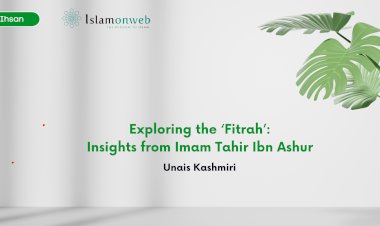Īmān (Faith), Islām (Submission), Iḥsān (Soulful Excellence): Ethical Foundations in Islam
Ethicality in Islam
Being vicegerents of Allah on Earth, human beings enjoy a distinguished position over other creatures. Therefore, they are required to follow a solid moral framework, practise good etiquette and show mutual respect for one another as part of fulfilling their duties on earth and contributing to civilization building. In this regard, Muslims have a special responsibility to uphold the trust (amānah) and to exert themselves into discharging their duties as vicegerents of Allah to the best of their abilities since they are endowed with true faith and submit to the will of Allah with sincerity.
The concept of tawḥīd enables the believer to articulate a comprehensive worldview and to serve the Creator and His creatures in the best possible manner. His sincere and unwavering belief in the authority of Allah spurs him into constructing an identity grounded in strong moral values, and prevents him from resorting to ‘imagined’ powers and from spreading immorality on earth. Moreover, the conduct of human life is to be strictly in line with the concept of ʿubūdiyyah (servitude) which is the highest and most sincere form of submission to the will of Allah. This fact also enables people to render their services with greater care and responsibility which are manifested as they exhibit highest levels of morality in dealing with others. The concept of amānah has a very significant role in building a moral framework. It signifies sincerity and honesty in our dealings with others which is the foundation of a moral life. Technically, it means to discharge one’s duties to Allah and His creatures faithfully.
According to Izutsu, in an ‘ethical religion’ like Islam, all the human characteristics manifested are religious as well as ethical at the same time.[i] With the advent of Islam, the world greatly benefited with a revised concept of morality offering meticulous rules of conduct, which were in fact a radical break from the then existing social order. But this did not necessarily mean that pre-Islamic Arabic was devoid of any distinctions between good and evil.
The three major dimensions of Islam, namely īmān (faith), islām (submission), and iḥsān (excellence) reflect the richness and the comprehensiveness of Islam’s ordinances in achieving moral perfection in all aspects of human life. Entry into Islam is restricted through subscription to the six articles of faith (īmān), which are belief in Allah, belief in His messengers, belief in the scriptures, belief in the angels, belief in the hereafter and belief in predestination. Remarkably, sincerity in faith is sufficient to transform a community into a morally virtuous one imbibed with socio-ethical integrity. Belief in Allah reminds people about His omnipotence which prevents them from overt and covert disobedience of Him. Belief in the messengers offers them a practical model of leading a morally virtuous life. Belief in the angels motivates people to strive to emulate them in constant worship of Allah. Belief in the scriptures enables people to use them as a guiding light which informs, directs and governs their everyday thoughts and actions. Belief in the hereafter motivates them to prepare for it with good deeds, and belief in predestination aids them in overcoming the difficulties of life without losing themselves and devoting their lives to the pleasure of Allah.
Islam means peace and submission, both of which have an intense impact on the ethical nurturing of human beings because the former is related to striving to live in peace and harmony with others, while the latter helps a person to be moral throughout his life. The concept of iḥsān[ii] (soulful excellence) forms an inclusive moral framework guiding a human being’s relations with Allah, fellow humans and the ecosystem. The Quran has used this word 70 times to denote good, beauty and symmetry. Iḥsān also generates an impetus for perpetuating qualities of righteousness, leading to being just in interactions with the ecosystem. The presupposition of performing duties and obligations in the presence of the Lord is a sufficient motive to strive for perfection, as iḥsān signifies to “Worship Allah as if you see Him, and if you cannot see Him, then indeed He sees you".[iii] Iḥsān embodies the spirit of the Sharīʿah and emphasises the fact that no act is considered beautiful unless it is performed while being conscious of Allah.[iv] The foundation of all moral attitudes is the consciousness of Allah (taqwā), which creates a sense of accountability and rouses people to strive to earn the pleasure of Allah by performing virtuous acts and staying away from all that He dislikes. Moreover, Islam stresses the point that human beings are accountable for their actions and will be answerable to them on the Day of Judgement (the Quran, al-Anbiyā’: 16, al-Qiyāmah: 36 and al-Anfāl: 27). In fact, the Quran is a book of moral guidance which explains the rules of human relations, replete with lessons on justice, kindness and benevolence.[v]
The objective of the vast body of Islamic law can be summed up as the establishment of an ethically competent society that meets societal demands of integrity and justice. The entire body of fiqh is a structured composite of law and morality, which appears to be an indivisible entirety to the extent that a dichotomy between the two is inconceivable.
The fuqahā’ categorised the duties as being the rights of Allah and being the rights of man. The fulfilment of the former benefits the public while the fulfilment of the latter benefits the individuals. The corpus of religious rulings embodies a cluster of principles, which a Muslim must adhere to in all circumstances and scenarios.[vi] The fiqh treatises are deeply intertwined with ethics, the common good and universal values of humanity. When the text and its context are analysed together, descrying the nuanced rulings of the fiqh and applied ethics as being drawn out from ethical theories becomes quite perceptible. The crux of Islamic law demands people to strive towards moral perfection, be law abiding and humanitarian in their dealings with each other.
[i][i] Thoshihiko Izutsu, Ethico-Religious Concepts in the Qur'an (Canada: McGill-Queen’s University Press, 2006), xiii.
[ii] Some use it as term for benevolence and kindness.
[iii] Al-Bukhārī, al-Jāmiʿ al-Saḥīḥ, 1: 20.
[iv] Sachiko Murata and William C. Chittick, The Vision of Islam (London and New York: I.B. Tauris, 2006), 274.
[v] Fazlur Rahman, “Law and Ethics in Islam”, 8.
[vi] Sayed Sikandar Shah Haneef, Ethics and Fiqh for Daily Life: An Islamic Outline, (Kuala Lumpur: IIUM, 2005), 109.
About Author: Sayyed Mohamed Muhsin is an assistant professor of Islamic jurisprudence at International Islamic University (IIUM), Kuala Lumpur. He also serves as Editor-in-Chief of Islamonweb-English
Disclaimer
The views expressed in this article are the author’s own and do not necessarily mirror Islamonweb’s editorial stance.
71 Comments
-

-

The article on Islamonweb beautifully explains the relationship between Īmān, Islām, and Iḥsān as essential ethical foundations in Islam. It highlights how faith, submission, and soulful excellence are intertwined to guide a Muslim's conduct both spiritually and ethically. As a student in university it help me to understand more on the particular aspect individually.
-

The article emphasises thatin Islam, ethics are rooted in the belief that humans are vicegerents of Allah, responsible for keeping moral values, honesty, and respect. The concepts of tawhid ,ubudiyyah, and ihsan guide believers to lead a morally virtuous life, bringing accountability and the importance of good deeds. Islamic teachings promote justice, kindness, and ensuring that individuals contribute positively to society and uphold their duties to both Allah and human beings around them.
-

The articles provides a deeper understanding of the ethical foundations of Islam. It shows how a Muslim's actions are influenced by a faith that goes beyond mere belief, with worship and behavior reflecting their submission. Ihsan highlights the importance of spiritual depth and motivates believers to strive for moral excellence. Together, these interconnected principles create a thorough framework for living a moral life.
-

In this reading, it emphasized on how individuals are guided to live morally and responsibly, avoiding actions driven by false beliefs or selfish desires. The idea of ʿubūdiyyah reminds people to align their actions with God's will and then encourages them to treat others with integrity, fair and kindness.
























Leave A Comment